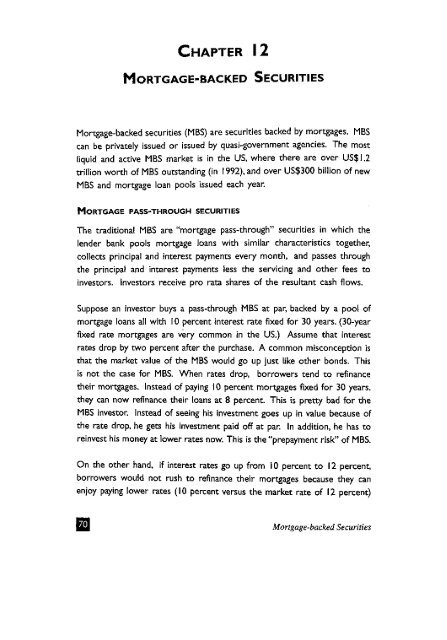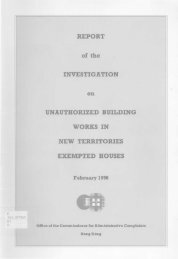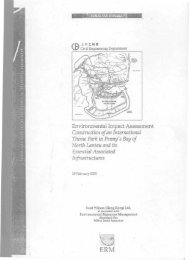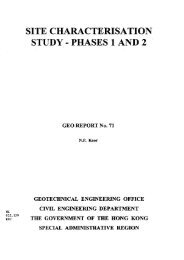Derivatives in Plain Words by Frederic Lau, with a ... - HKU Libraries
Derivatives in Plain Words by Frederic Lau, with a ... - HKU Libraries
Derivatives in Plain Words by Frederic Lau, with a ... - HKU Libraries
- No tags were found...
Create successful ePaper yourself
Turn your PDF publications into a flip-book with our unique Google optimized e-Paper software.
12Mortgage-backed securities (MBS) are securities backed <strong>by</strong> mortgages. MBScan be privately issued or issued <strong>by</strong> quasi-government agencies. The mostliquid and active MBS market is <strong>in</strong> the US, where there are over US$1.2trillion worth of MBS outstand<strong>in</strong>g (<strong>in</strong> 1992), and over US$300 billion of newMBS and mortgage loan pools issued each year.MORTGAGE PASS-THROUGH SECURITIESThe traditional MBS are "mortgage pass-through" securities <strong>in</strong> which thelender bank pools mortgage loans <strong>with</strong> similar characteristics together,collects pr<strong>in</strong>cipal and <strong>in</strong>terest payments every month, and passes throughthe pr<strong>in</strong>cipal and <strong>in</strong>terest payments less the servic<strong>in</strong>g and other fees to<strong>in</strong>vestors. Investors receive pro rata shares of the resultant cash flows.Suppose an <strong>in</strong>vestor buys a pass-through MBS at par, backed <strong>by</strong> a pool ofmortgage loans all <strong>with</strong> 10 percent <strong>in</strong>terest rate fixed for 30 years. (30-yearfixed rate mortgages are very common <strong>in</strong> the US.) Assume that <strong>in</strong>terestrates drop <strong>by</strong> two percent after the purchase. A common misconception isthat the market value of the MBS would go up just like other bonds. Thisis not the case for MBS. When rates drop, borrowers tend to ref<strong>in</strong>ancetheir mortgages. Instead of pay<strong>in</strong>g 10 percent mortgages fixed for 30 years,they can now ref<strong>in</strong>ance their loans at 8 percent. This is pretty bad for theMBS <strong>in</strong>vestor. Instead of see<strong>in</strong>g his <strong>in</strong>vestment goes up <strong>in</strong> value because ofthe rate drop, he gets his <strong>in</strong>vestment paid off at par. In addition, he has tore<strong>in</strong>vest his money at lower rates now. This is the "prepayment risk" of MBS.On the other hand, if <strong>in</strong>terest rates go up from 10 percent to 12 percent,borrowers would not rush to ref<strong>in</strong>ance their mortgages because they canenjoy pay<strong>in</strong>g lower rates (10 percent versus the market rate of 12 percent)Mortgage-backed Securities
















